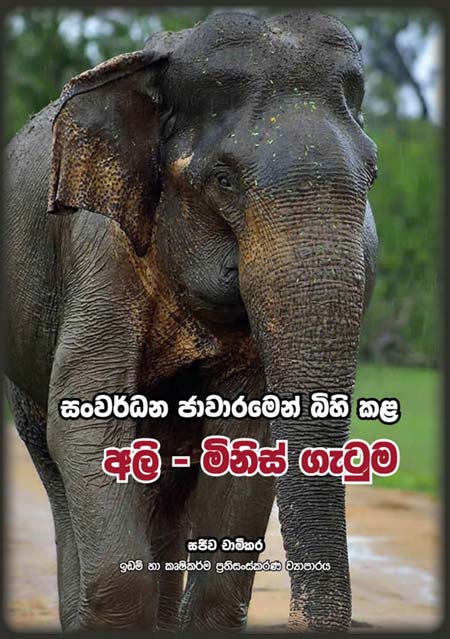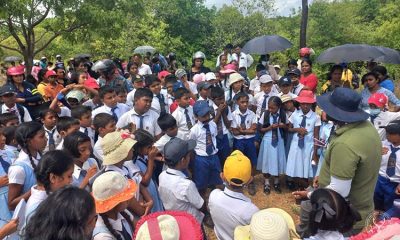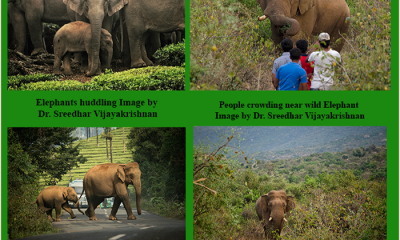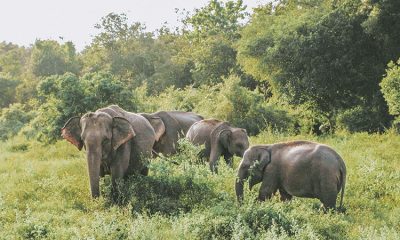News
MONLAR lashes out at Wildlife Dept. for failure to protect elephants
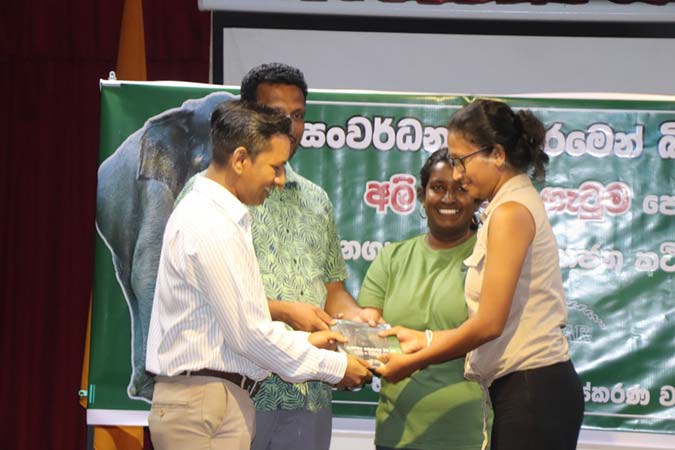
By Rathindra Kuruwita
The Department of Wildlife has given up efforts to protect elephants in the country, Sajeewa Chamikara of the Movement for Land and Agricultural Reform (MONLAR) has said. Addressing a gathering at the launch of his book, Sanwardana Jawaramen bihikala Ali minis getuma (The Human-Elephant Conflict: A Creation of the Development Racket), on Wednesday, Chamikara said successive governments had been trying to convince people that there were too many elephants in the country.
“They would want people to believe that the human-elephant conflict (HEC) is due to the excess of elephants. A lot of time and resources are expended to propagate this lie and a large number of people have come to believe it. The government wants to get rid of the elephants to implement the National Physical Plan,” Chamikara said.
“The number of elephants killed in 19 years from 1951 to 1969 was 1,163. This works out to about 61 elephant deaths a year.
“However, 5,010 elephants have been killed in the 19-year period from 2004 to April 2023.
“Last year saw the highest number of elephant deaths recorded since the country’s Independence; 433 elephants were killed. The highest number of human deaths also occurred due to elephant attacks in the same year. The number of human casualties were 145.
“In the 34 years from 1990 to April 2023, a total of 6,642 elephants have died. About 70% of them were killed by humans as a result of the human-elephant conflict. Meanwhile, 2,032 people were killed in elephant attacks in the 26 years from 1998 to April 2023.
Many believed that an increase in the elephant population had contributed to the human-elephant conflict. However, there was no evidence to suggest that the elephant population is on the rise.
“In the decades following the year 2000, elephant habitats have dwindled. Elephant fences have been erected without a plan throughout the dry zone, fragmenting forests. These fences have separated forests that are under the purview of the Wildlife department, the Forest Conservation department, and the Mahaweli Authority from each other.
“These are all state entities. Because of these turf battles, elephants can’t move between forests. This is because erecting electric fences has become a money-making enterprise. Then unplanned settlements and large-scale commercial agricultural projects, which are recommended under the National Physical Plan, the IMF and the World Bank, too, have contributed to the reduction of elephant habitats.”
Chamikara also said that the quality of the surviving habitats too had deteriorated over time. Invasive plant species had spread in large swaths of forest land where elephants live, and about 54 garbage dumps had been established near forest reserves. Those factors draw elephants out of protected areas, he said.
“We also try to send as many tourists as possible to areas where there are lots of elephants. And this is a disturbance to elephants, and they try to escape this by going out of forest reserves into human settlements. This is another cause of human-elephant conflict,” Chamikara said.
News
US sports envoys to Lanka to champion youth development

The U.S. Embassy in Colombo welcomed the U.S. Sports Envoys to Sri Lanka, former National Basketball Association (NBA) and Women’s National Basketball Association (WNBA) players Stephen Howard and Astou Ndiaye, from June 8 through 14.
The Public Diplomacy section of the U.S. Embassy said that it would launch a weeklong basketball program intended to harness the unifying power of sports, made possible through collaboration with Foundation of Goodness and IImpact Hoop Lab.
While in Sri Lanka, Howard and Ndiaye, both retired professional basketball players, will conduct a weeklong program, Hoops for Hope: Bridging Borders through Basketball. The Sports Envoys will lead basketball clinics and exhibition matches and engage in leadership sessions in Colombo and Southern Province for youth aged 14-18 from Northern, Uva, Eastern and Western Provinces, offering skills and leadership training both on and off the court. The U.S. Envoys will also share their expertise with the Sri Lanka Basketball Federation, national coaches, and players, furthering the development of basketball in the country. Beyond the clinics, they will collaborate with Sri Lankan schoolchildren to take part in a community service project in the Colombo area.
“We are so proud to welcome Stephen and Astou as our Sports Envoys to Sri Lanka, to build on the strong people-to-people connections between the United States and Sri Lanka,” said U.S. Ambassador Julie Chung. “The lessons that will be shared by our Sports Envoys – communication, teamwork, resilience, inclusion, and conflict resolution – are essential for leadership development, community building, equality, and peace. The U.S. Sports Envoy program is a testament to our belief that sports can be a powerful tool in promoting peace and unity.”
News
Rahuman questions sudden cancellation of leave of CEB employees

SJB Colombo District MP Mujibur Rahuman in parliament demanded to know from the government the reasons for CEB suspending the leave of all its employees until further notice from Thursday.
MP Rahuman said that the CEB has got an acting General Manager anew and the latter yesterday morning issued a circular suspending leave of all CEB employees with immediate effect until further notice.
“We demand that Minister Kanchana Wijesekera should explain this to the House. This circular was issued while this debate on the new Electricity Amendment Bill was pending. There are many who oppose this Bill. The Minister must tell parliament the reason for the urge to cancel the leave of CEB employees,” the MP said.However, Speaker Mahinda Yapa Abeywardena prevented Minister Wijesekera responding to the query and said that the matter raised by MP Rahuman was not relevant.
News
CIPM successfully concludes 8th Annual Symposium

The Chartered Institute of Personnel Management (CIPM) successfully concluded the 8th Annual CIPM Symposium, which took place on 31st May 2024. Themed “Nurturing the Human Element—Redefining HRM in a Rapidly Changing World,” the symposium underscored the pivotal role of human resource management (HRM) in today’s dynamic global landscape. Since its inception in 1959, CIPM has been dedicated to advancing the HR profession through education, professional development, and advocacy, solidifying its position as Sri Lanka’s leading professional body for HRM.
Ken Vijayakumar, the President of the CIPM, graced the occasion as the chief guest. The symposium commenced with the welcome address by the Chairperson, Prof. Arosha Adikaram, followed by the Web Launch of the Symposium Proceedings and Abstract Book by the CIPM President. The event featured distinguished addresses, including a speech by Chief Guest Ken Vijayakumar, President of CIPM, and an address by Guest of Honor Shakthi Ranatunga, Chief Operating Officer of MAS Holdings Pvt. Ltd., Sri Lanka.
The symposium also featured an inspiring keynote address by Prof. Mario Fernando, Professor of Management and Director of the Centre for Cross Cultural Management (CCCM) at the University of Wollongong, Australia.
Vote of Thanks of the inauguration session was delivered by Dr. Dillanjani Weeratunga, Symposium Co-chair.
The symposium served as a comprehensive platform for researchers to present their findings across a wide range of critical topics in HRM. These included Cultural Diversity and Inclusion, Talent Development and Retention, Ethical Leadership and Corporate Social Responsibility, Adapting to Technological Advancements, Mental Health and Well-being at Work, Global Workforce Challenges, Employee Empowerment, and Reskilling and Upskilling.
The plenary session was led by Prof. Wasantha Rajapakse. Certificates were awarded to the best paper presenters during the valedictory session, followed by a vote of thanks delivered by Kamani Perera, Manager of Research and Development.
The annual symposium of CIPM was a truly inclusive event, attracting a diverse audience that spanned undergraduates, graduates, working professionals, research scholars and lecturers. This widespread interest highlights the symposium’s significance in the field of HRM, offering a unique opportunity for everyone to network and learn from scholarly brains.The CIPM International Research Symposium was sponsored by Hambantota International Port, Sri Lanka Institute of Information Technology (SLIIT), E B Creasy & Co. PLC, and Print Xcel Company.

